Will United Methodists Lead The Way In Rejecting Anti-Israel Divestment?
Hoping United Methodist Church General Conference will reject biased, one-sided, anti-peace attack on Israel.

Every four years the United Methodist Church General Conference (UMCGC) meets to make policy decisions and set the direction for the denomination.
From May 10th through May 20th, 864 delegates (half of them clergy) are convening at the Oregon Convention Center in Portland to consider over 1,000 resolutions.
Mt Hood will become old friend during United Methodist General Conference in Portland, for good or evil! #UMCGC pic.twitter.com/VB6jJ0e9kZ
— Mark Tooley (@markdtooley) May 5, 2016
Among them are four new proposals prepared by the United Methodist Kairos Response (UMKR), a vehemently anti-Israel subgroup within the church.
The resolutions ask the denomination to divest from Caterpillar, Motorola Solutions and Hewlett-Packard because they’re “companies that profit from Israel’s occupation of Palestinian lands”.
In a prior post, we highlighted these resolutions, and the UMKR’s efforts to push malicious anti-Zionist propaganda through the United Methodist denomination. It’s part of broad agenda to promote BDS (boycott, divestment, and sanctions) within America’s liberal Protestant churches.
#UMCGC: Vote NO to #Israel divest. Sabeel/UMKR pushing bigotry in ur church | @markdtooley @TheIRD https://t.co/T8YcKotIG4 via @sharethis
— Miriam F. Elman (@MiriamElman) May 12, 2016
In fact, BDS activists have been anticipating that “2016 could be the biggest year yet for church divestment”.
But, maybe not.
Some Methodists who are now in Portland, and with whom I’ve been in contact, are saying that the UMKR’s four proposed resolutions will probably be voted down.
There are at least 5 reasons why the 2016 quadrennial UMC General Conference (UMCGC) may end up delivering a BDS fail.
1. UMKR is being exposed for its bigotry.
Established in 2010, UMKR presents itself as a socially progressive grassroots organization taking a principled stand for nonviolence and Palestinian freedom.
It’s a mission that seems worthy of support.
Getting the booth going #kairosGC2016 pic.twitter.com/ig5lmbMyFu
— J.R. Atkins (@jratkins) May 10, 2016
But as we noted in a prior post, the group endorses the 2009 Kairos Palestine Document (KPD) as a model for Israeli-Palestinian peace. It’s a hate-filled document that views the Jewish state as a “sin against God and humanity”.
Some of the Palestinian drafters and signatories of the KPD reportedly had ties to terrorist organizations and a number of others supported and encouraged Palestinian suicide bombings during the second intifada.
Over the years, the KPD has been condemned as a “massive lie” and a “factually, theologically and morally flawed” history of the conflict and roadmap for peace (for a list of critical statements from various Christian and Jewish organizations, see here). Despite these many condemnations, the UMKR sees no problem firmly associating itself with a document that is “supersessionist and anti-Semitic in nature”.
This is a lot of damning information about a group that’s supposed to be committed to peace and justice.
But most church members aren’t familiar with UMKR’s “theological assault on Israel”. The group comes across as perfectly moderate and reasonable.
But in Portland it’s made the mistake of having Janet Lahr Lewis serve as its spokesperson.
Anti-Israel boycott/divestment advocate, GBGM missionary Janet Lahr Lewis speaks at #UMCGC https://t.co/n7OmWvYqxU pic.twitter.com/1CwpgrDnG4
— Jeff Walton (@jeffreyhwalton) May 12, 2016
Lewis, a prominent missionary in the UMC’s General Board of Global Ministries and its Advocacy Coordinator for the Middle East, was recently criticized for likening the situation facing Palestinians to the Holocaust, and the Armenian and Rwandan genocides.
Last year, in an essay that was originally featured in the online newsletter of the church’s General Board of Church and Society, but was then removed, she urged the boycotting of the U.S. Holocaust Memorial Museum in Washington D.C.
The UMKR’s critics in Portland have lost no time disseminating Lewis’ ugly back-story and implicating UKMR in the scandal.
A Methodist official who called for boycott of Holocaust museums calls for boycott of Israel at #UMCGC https://t.co/AS80N9JFqF
— Vine and Fig Project (@VineFigProject) May 12, 2016
An article revealing her shameful and “unvarnished holocaust candor” and her unremitting hostility to Israel has also been shared on social media this week.
Bottom line: The UMKR has for years essentially enlisted the UMC in a propaganda war against Israel, embracing an anti-Semitic replacement theology in which Israeli Jews are the ‘new Nazis’ and the Palestinians are the ‘new Jews’. Most church members don’t know about any of that. But the UMKR’s decision to have Janet Lahr Lewis present its divestment resolutions to church delegates in Portland has made it easier to expose its hateful message. In promoting the discredited Lewis at the UMC General Conference, the UMKR made a serious tactical error.
2. Anti-Israel ‘Jewish Voice for Peace’ is much less visible.
As we’ve highlighted in many posts (for a partial list, see here), JVP—a group committed to convincing the American public that Israel is a pariah state which deserves to be ostracized—serves a useful function to the anti-Israel BDS movement. It helps convince church congregations that standing against Israel won’t harm interfaith dialogue or compromise longstanding and important relationships with the American Jewish community.
Like in the past, local JVP activists are playing a role in Portland.
Last week, in advance of the UMCGC, a JVP member—Alice Rothchild, who self-describes in her byline as a retired physician, author and filmmaker—wrote an op-ed for The Oregonian that’s been shared on the conference’s social media.
Thoughtful piece for United Methodists and delegates to #UMCGC by Dr. Alice Rothchild https://t.co/uQqS0zY1kt #kairosGC2016
— Andrea Whitmore (@AndyKCity) May 8, 2016
Rothchild argues that divestment is an “appropriate response to Israel’s treatment of Palestinians”, prompted by a genuine concern for social justice and not in any way in conflict with Jewish interests or values.
Her essay is the typical one-sided anti-Israel slander that’s standard fare among BDS proponents. Rothchild argues that Israel is an apartheid state and a colonizing oppressor that’s usurped Palestinian lands and refuses to make peace.
(For a scathing rejoinder to Rothchild’s essay, see here. It’s written by Leon Jamaine Mithi, a black Zimbabwean who grew up in apartheid South Africa, and so is intimately familiar with how South African blacks suffered under a strict system of racial segregation. Mithi calls on Methodists in Portland to stand with Israel and vote down the divestment resolutions).
But other than Rothchild’s guest column and some tweets on the conference’s various Twitter hashtags, JVP hasn’t been very visible at the UMCGC.
Some JVP members are there, based on the tweets.
.@jvplive at #umcgc2016 Come to #KairosGC2016 reception hearing of loss of land of the Loumad people. pic.twitter.com/msNK5RIl2g
— maxinef (@maxinefookson) May 12, 2016
Thank you Jewish Voice for Peace, for being strong allies for #UMCGC divestment from the occupation! #KairosGC2016 https://t.co/3wcpBhbLKd
— UM Kairos Response (@UMKairosResp) May 14, 2016
But compared to the large contingent of JVP activists who’ve been an outsized, noisy presence at the 2014 Presbyterian General Assembly and at last summer’s United Church of Christ Synod, the group seems to be virtually nonexistent at the UMCGC.
To confirm, I contacted Mark Tooley, President of the Institute on Religion and Democracy (IRD), an organization based in Washington DC. For some years it’s been at the forefront of the effort to combat the ugly Jew-hatred that’s becoming more pervasive in America’s mainline churches.
Tooley, a United Methodist member who’s attended 7 prior General Conferences (and who also wrote the article noted above exposing Janet Lahr Lewis’ “absurd and disgusting” anti-Israel stance), emailed me back over the weekend.
He corroborated my impressions: JVP has showed up at the Portland convention center, but so far not in any large numbers.
Bottom line: JVP, which represents only the tiniest sliver of American Jewish public opinion, has always been more than happy to help delude mainline U.S. Protestant church members into thinking that there’s significant support for BDS within the American Jewish community. They’ve been a visible presence at many past church conferences and conventions. But in Portland they’ve been conspicuously absent. Maybe they too now suspect that the divestment resolutions are unlikely to pass there and don’t want to be associated with a losing BDS-related initiative. But whatever the reason, JVP’s no-show undermines the UMKR’s ability to falsely portray its divestment resolutions to hesitant delegates as something “many Jews” endorse.
3. An anti-BDS contingent is fielding credible counter-arguments.
On the eve of the UMC General Conference, Hillary Clinton, the Democratic presidential frontrunner and a lifelong Methodist, publicly issued an “emphatic condemnation of BDS”.
In a letter sent to the Jewish Action Network, Clinton criticized BDS as counterproductive to peace. The Israel Action Network specifically appealed to her to respond ahead of quadrennial UMCGC. She never mentions the General Conference in her two-page letter. But it’s clear from its timing that the intended audience was her fellow Methodists themselves.
Clinton calls BDS "counterproductive to the pursuit of peace & harmful to Israelis & Palestinians alike" https://t.co/SuL86Wx7Rq #umc #UMCGC
— IRD (@TheIRD) May 11, 2016
Clinton’s missive can’t do any harm.
It may convince at least some church delegates in Portland to vote against divestment. But the reality is that defeating BDS resolutions always requires effective grassroots activism on the ground.
As I wrote in a prior post, the UMKR has been able to operate in the church virtually unopposed because a competing group, United Methodists for Constructive Peacemaking in Israel and Palestine (UMCPIP), wasn’t doing a whole lot.
In Portland though, the UMCPIP seems to have picked up its game.
Last week it hosted a press conference where Methodists were able to hear alternatives to anti-Israel divestment.
According to an essay about the event published by on the IRD’s blog, Juicy Ecumenism, speakers slammed attempts by divestment advocates to view the Israeli-Palestinian conflict as “analogous to 1980s apartheid-era South Africa or the 1960s civil rights movement in the United States”.
The UMCPIP-hosted event also saw various presenters lambasting the UMKR’s caricatured account of the conflict, its refusal to see any “righteousness” in Israel, or to accept that it has “legitimate concerns about security”.
Basically, these delegates rightfully declared the anti-Israel divestment proposals sponsored by the UMKR as “punitive and violent measures”.
Three petitions (“Investment Ethics”, “Diplomacy and Investments in Palestine”, and “Saying No to Violence in Middle East Conflict”) were also introduced. They’re aimed at rewarding “good peace and good peacemaking behavior”.
Methodists Hear Alternatives to Anti-Israel Divestment https://t.co/alxf9UWQBE via @TheIRD
— TweetsbyFaithAlone-GDsThreshingSledge(Isaiah41:15) (@Cuchulain09) May 12, 2016
Should Methodists uniquely target #Israel for divestment? Alternatives proposed at #UMCGC https://t.co/pQMdR6zZGB pic.twitter.com/ARflWGZQ5T
— Jeff Walton (@jeffreyhwalton) May 11, 2016
The UMCPIP is hopeful that these will be voted up in plenary, replacing the UMKR’s proposals that only “punish one side”.
So the UMCPIP has upped the pressure on BDS proponents at this General Conference. Others there are also opposing the UMKR’s anti-Israel agenda.
Now working the issue is a group of Christian Zionist professionals from the IRD and the Philos Project. For the most part, they’ve been challenging the UMKR on the conference’s social media platforms.
Supposedly the Jews are not the indigenous people of Israel. Things you learn from UM Kairos meeting. #UMCGC #rejectBDS #KairosGC2016
— Luke Moon (@lukemoon1) May 12, 2016
Filled with inaccuracies, half truths, and blatantly ignorant propaganda.
— Ted Fine (@tsfine) May 12, 2016
For the last few days, they’ve also been exposing the anti-Semites who invariably gravitate to BDS activism.
Some of them are also writing longer op-eds and blogs trying to get the word out about the BDS war on Israel in general, and the UMKR’s hostility to the Jewish state in particular.
A noteworthy example is the “Open Letter to United Methodists Considering Divestment” published last week and disseminated widely via social media to delegates in Portland.
In it Luke Moon, who serves as Deputy Director of the Philos Project and was formerly the business manager at the IRD, persuasively argues that for all the talk of human rights and social justice, the UMKR’s screwed up priorities wind up harming the very people that the church should be supporting—Palestinian Christians who’re desperately in need of the global church’s solidarity and assistance.
In this compelling essay, Moon forces UMKR to address why they aren’t sponsoring any resolutions for protecting Christian heritage in the Holy Land from the Palestinian authorities who seek to obliterate it, or any that express outrage at the religious and social prejudice and intimidation that makes it “difficult or impossible” for Christian Arabs in the Palestinian territories to be fully integrated into society and to spread the Gospel.
Will UM Kairos Response tell UM delegates that it's illegal to convert from Islam in Palestine? https://t.co/zC0yc7JssP #UMCGC
— Luke Moon (@lukemoon1) May 12, 2016
Declaring a future Palestinian state to be free of Jews is racism. https://t.co/zC0yc7JssP #UMCGC #rejectBDS #KairosGC2016
— Luke Moon (@lukemoon1) May 12, 2016
Will @UMKairosResp tell #UMCGC delegates about the Palestinian human rights abuses against Palestinians? https://t.co/zC0yc7JssP #RejectBDS
— Luke Moon (@lukemoon1) May 10, 2016
To the larger body of Methodists who’ve congregated in Portland to further national and global human rights, it must look bizarre that UMKR is obsessed with Israel at the expense of the real sources of Palestinian Christian suffering.
If you love Israel and the Jewish people. Please pray now as the UMC is taking up the issue of divestment. #UMCGC #rejectBDS
— Luke Moon (@lukemoon1) May 13, 2016
Bottom line: Anti-BDS delegates are much more visible in Portland than they’ve been in the past. They’re meeting the mistruths and distortions of UMKR head on at hosted events and in op-eds and blogs that are getting read and discussed. They’re also offering a set of pro-peace counter-proposals consistent with the church’s teachings. Although weighing in from afar, Clinton’s effort to “awaken her co-religionists” to how BDS is not only deeply wrong, but also harmful to the cause of peace, also helps.
4. Most delegates are focused on other issues.
Divesting from companies supporting the alleged illegal occupation of Palestinian-claimed territories is considered among the “6 things to watch” at the 11-day-long Methodist General Conference. But the reality is that the UMKR’s BDS-related proposals simply aren’t grabbing a lot of attention. There are more than 100 petitions related to human sexuality, primarily LGBTQ inclusion, alone.
That’s some pretty stiff competition, in terms of delegate interest. It’s forcing the UMKR to work hard to stay relevant.
In an important Wall Street Journal op-ed published this past weekend, the IRD’s Mark Tooley says that there’s a “culture-war showdown” underway at the UMCGC, where American liberal delegates are clashing with conservative evangelicals—especially Africans.
As Tooley explains, it’s nothing new for Methodists to be debating and protesting Christian sexual ethics—they’ve been doing that since 1972. But the church’s growing membership in the Philippines and in Africa, where Methodists tend to be “theologically conservative”, is bringing these debates to a head.
With more than 40% of delegates now coming from outside of the U.S., tensions are clearly running high. In advance of this year’s GC, more than 100 liberal clergy publicly announced their homosexuality. And in Portland there’ve been various pro-LGBTQ protests.
Long-time lesbian activist "ordained" Tuesday morning during an unofficial ceremony at #UMCGC https://t.co/CSCYqzJisC #UMC #GlobalUMC #LGBTQ
— IRD (@TheIRD) May 13, 2016
#Methodists Unofficially "Ordain" Non-Celibate #Lesbian at #UMCGC | https://t.co/OOvfXVManO #UMC #GlobalUMC #LGBTQ pic.twitter.com/UkvaWVTkEw
— IRD (@TheIRD) May 13, 2016
To be sure, church delegates aren’t spending all their time hotly engaging on the controversial topics of abortion, same-sex marriage and active gay clergy. According to Tooley, they’re also worshipping, socializing with old friends and colleagues, and frequenting the exhibition hall, which includes a “smorgasbord of Methodist causes and bric-a-brac”.
But it’s obvious that “arguments about gay people”, and the implications of any major liberalization of the church’s position on marriage for the denomination’s continued overseas growth, are sucking up a lot of the oxygen in Portland.
So the UMKR is probably having a tough time getting delegates to focus on its Israel-bashing. In fact, the most visible debates surrounding divestment haven’t been about Israel at all. They’ve been spearheaded by a group calling itself the Fossil Free UMC:
Amazing action by @FossilFreeUMC calling on Methodist church to #divest at #UMGC. #sacredearth2016 #breakfree2016 pic.twitter.com/ugFKOj1FtH
— OurVoices (@ourvoices2015) May 13, 2016
Bottom line: The majority of church members at the UMCGC are concentrating on gay rights issues and other topics of relevance to the denomination’s heated “culture wars”. The UMKR’s agenda simply isn’t on the radar screen of a large number of delegates in Portland.
5. Many foreign delegates—especially Africans—don’t hate Israel.
Methodist and UMCGC delegate Mark Tooley notes that the church’s “ongoing sour attitude towards the Jewish homeland” will be deeply troubling to many members:
[it] ought to send genuinely Christian people repentantly to their prayer closets in search of forgiveness and divine counsel”.
Those most likely to be repelled are African Methodists steeped in biblical church teachings and the Gospels.
More likely to be conservative traditionalists than progressive social justice warriors, the vast majority of them would view Jews as aboriginal to their ancestral homeland in Judea and Samaria. They’d also consider the Christian faith and the state of Israel as “irrevocably intertwined”, and would respect that the Christian faith flows naturally from Judaism.
So, they’re likely to look askance at the UMKR’s effort to disassociate their beloved church from the Jewish state.
But that’s not stopping the UMKR.
In Portland the group is trying to appeal to foreign delegates by playing up the ‘indigenous card’. At a May 11th gathering it tried to “showcase international, multi-ethnic and missionary support” for divestment.
Basically, the UMKR is trying to make the case that Israel is a colonialist occupier and the Palestinians are natives who have a ‘right of return’.
For traditionalist Africans, though, this effort to intersect alleged global oppressions is probably coming off as either lame—or deeply insulting.
These Methodists are fully aware of the historical and continuous Jewish presence in the land of Israel that stretches back thousands of years. Most undoubtedly think that it’s the Jews who are an indigenous people who never lost touch with their roots and eventually regained and rebuilt their ancestral lands.
Basically, BDS advocates in Portland don’t have much to work with when it comes to the large number of foreign delegates, especially Africans, most of whom aren’t interested in buying what the UMKR’s peddling.
Indicative of this rejection is the fact that no African United Methodists reportedly spoke at the May 11th UMKR-hosted panel for ethnic caucuses, despite being invited to do so.
In an email he sent me over the weekend, Mark Tooley, President of the Institute on Religion and Democracy confirmed the significance of the church’s shifting demographics for the viability of the UMKR’s anti-Israel agenda:
I don’t expect divestment to pass. It’s been rejected twice before. It’s not doing well so far in committee. The pension board opposes it. But will the church move away from its larger hostility to Israel as expressed through its policy statements, its missions board and DC lobby? The growing Africanization of the church provides an opportunity for a new and better perspective”.
Bottom line: Because of the growing non-American membership of the UMC, the UMKR’s anti-Israel narrative and its pro-BDS agenda is increasingly likely to be viewed with suspicion, if not outright derision. At Portland, the UMKR’s four divestment proposals stand a good shot at being voted down because of the reticence of many non-U.S. delegates to embrace social justice stances that involve repudiating the Bible, the Christian Gospels, and traditional church teachings.
Thank God for the powerful and vibrant witness of so many Africans in the United Methodist Church. Such encouraging leadership. #UMCGC
— Ray Nothstine (@RayNothstine) May 15, 2016
6. Conclusion
With some 7 million members (and roughly 12 million worldwide), the United Methodist Church is the largest mainline Protestant denomination in the United States, so it would be significant to have it come out in favor of anti-Israel divestment.
#GC2016 Finally, UMC gets to join Presbyterians and UCC and align their investments with the Gospel this week. GO #umcgc2016 ! #KairosGC2016
— noushin (@noushin) May 10, 2016
It would mean that all the mainstream Protestant churches in the U.S. will have endorsed boycott and divestment in one form or another—an outcome that would undoubtedly be milked by BDS activists as confirmation that their cause is both principled and righteous.
I’m not a Methodist and I can’t say for sure what’s going to happen this week at the quadrennial General Conference now underway in Portland. But based on what people who are there are saying, it’s very likely that the divestment resolutions that’ve been presented by the United Methodist Kairos Response (UMKR)—a vehemently anti-Israel church subgroup—will be defeated.
The UMKR has spent years softening up United Methodists for a divestment vote, and so they may still get lucky.
My view on Saturday morning. For Zion's sake… #UMCGC #rejectBDS #KairosGC2016 pic.twitter.com/EohBeFkgoa
— Luke Moon (@lukemoon1) May 14, 2016
But this week it’ll be an uphill battle for them to convince delegates to support their cause. Faced with some serious opposition and a delegate body that’s focused on other issues, like the church’s marriage stance, there’ll be no easy BDS win in Portland.
Featured image: John Wesley bobble heads sold at the United Methodist General Conference’s exhibition hall. Credit: Mark Tooley | Juicy Ecumenism
Miriam F. Elman is an associate professor of political science at the Maxwell School of Citizenship & Public Affairs, Syracuse University. She is the editor of five books and the author of over 60 journal articles, book chapters, and government reports on topics related to international and national security, religion and politics, the Middle East, and the Israeli-Palestinian conflict. She also frequently speaks and writes on the Boycott, Divestment, and Sanctions (BDS) anti-Israel movement. Follow her on Twitter @MiriamElman
Donations tax deductible
to the full extent allowed by law.

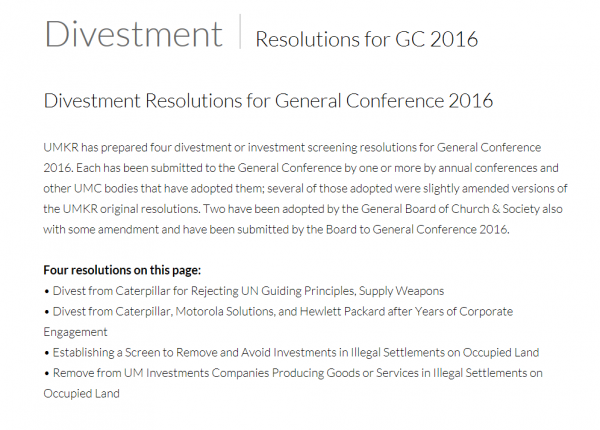
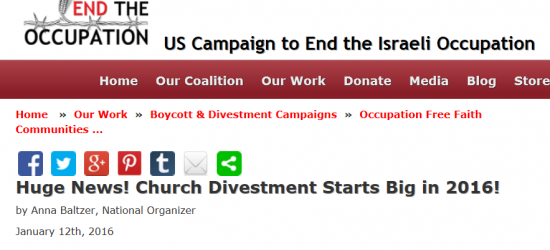


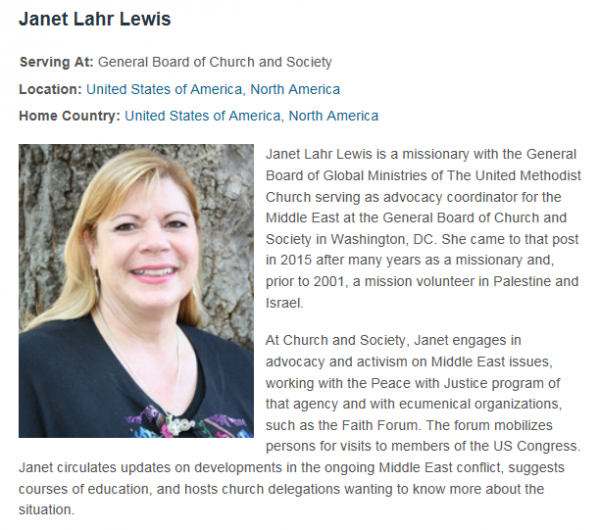
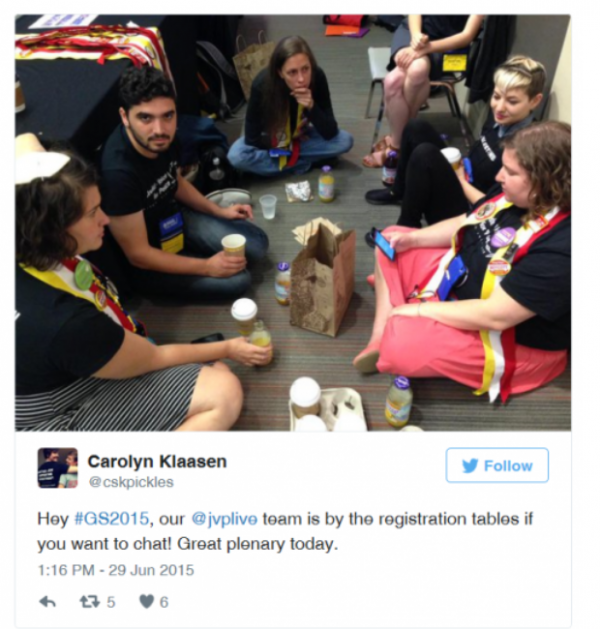
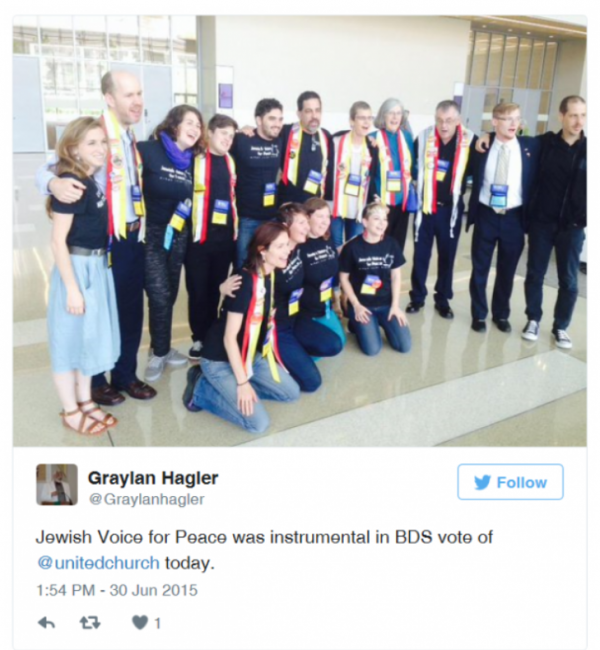
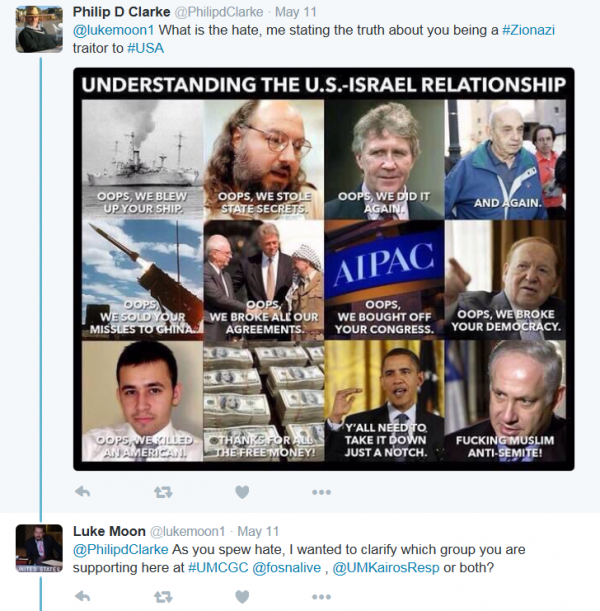

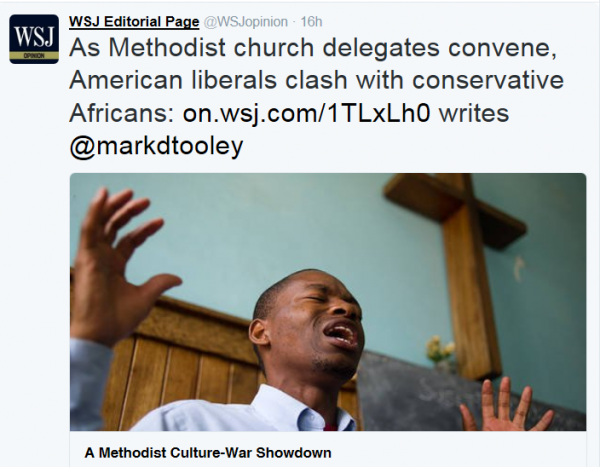








Comments
It wouldn’t be an annual Christian denominational gathering without the “Jewish” Voices for Peace offering themselves to those needing to clean up their act with Jew Washing.
I predict that as the Palestinian issue continues to decenter in the face of far more serious regional crises, mainstream interest in Israel vs the Pallys will start to wane..
Whether the solution is two states or a genocidal one state, there’s just no room in the region for another failed state.
I left the UMC three years ago after being a member for 25+ years. They have turned from a Biblical foundation to a Social Justice outlook that fails on so many levels. At the national level, they act more to provide cover for the Socialists that are determined to use mainline churches to press for socialism, rather than assisting the local churches with growth…and they are losing members rapidly over the last 5 years.
This is why Hubby and I left the UMC and are now attending the Baptist church. And it’s no wonder that the Baptist faith is growing and the Methodist is dieing. Methodist have become apostate in the extreme. Shame on anyone who calls them self a Christian and then say they’re anti-Israel. They sure don’t know their Holy Bible.